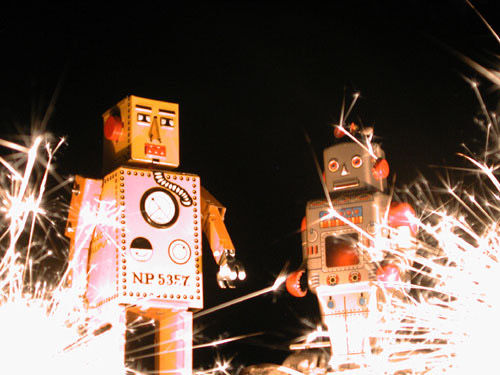Here, Sayer’s calls out our desire to create self-sufficient creatures, and what it might tell us about our relationship to God:
That no human maker can create a self-conscious being, we have already seen; and seen also that he is always urged by an inward hankering to do so, finding approximate satisfactions for this desire in procreation, in such relations as those of a playwright with his actors, and in the creation of imaginary characters. In all these relations, he is conscious of the same paradoxical need, namely, the complete independence of the creature combined with its willing co-operation in his purpose in conformity with the law of its nature. In this insistent need he sees the image of the perfect relation of Creator and creature, and the perfect reconciliation of divine predestination with free created will.
-Dorothy Sayers, The Mind of the Maker, Ch.9
In addition, the thing I take away from this is an explanation as to why robots are so fabulous!
AI is a high calling. Don’t worry Terminator fans. We don’t have to worry about Skynet or the Matrix. We’ll never get there. BUT, I don’t think we’ll ever stop trying. It’s just way to deep a desire. Part of our being made in the image of God find fullfilment in software development of a certain sort. It’s true!

It’s not at all unlike author’s toiling over his characters. In literature, we form our creations and watch them (with delight) as they walk around in it. In fairy-stories, we even form new worlds for them walk around in. The branches of AI and all their difficult obstacles (images recognition, natural language interpretation, wayfinding, memory, sensory response) are all pieces of the puzzle to make our own creatures to walk around in our world. If mechanical robotics themselves feel like more of an obstacle to you than a doorway, perhaps video game AI or other sorts of virtual expressions can satisfy part of this desire to create.
there is in the human creator a parallel desire to create something that shall have as much free will as the offspring of procreation. The stories which tell of attempts to manufacture robots and Frankenstein monsters bear witness to this strange desire. It is as though humanity were conscious of a hampering limitation of its functions; in man, the image of the divine strives, as it were, to resemble its original in both its creative and procreative functions: to be at once father and God.
-Ch.5
But true free will? No. But God? Why yes. When we say (with lots of rational proofs of course) that God couldn’t give us true free will, we’re acting like he must be just one of US.
